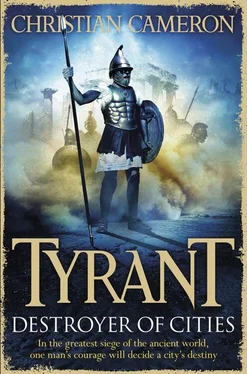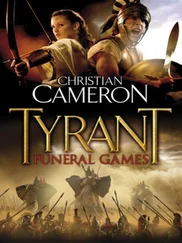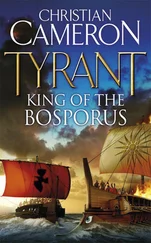Christian Cameron - Destroyer of Cities
Здесь есть возможность читать онлайн «Christian Cameron - Destroyer of Cities» весь текст электронной книги совершенно бесплатно (целиком полную версию без сокращений). В некоторых случаях можно слушать аудио, скачать через торрент в формате fb2 и присутствует краткое содержание. Год выпуска: 0101, Издательство: Orion Books, Жанр: Исторические приключения, на английском языке. Описание произведения, (предисловие) а так же отзывы посетителей доступны на портале библиотеки ЛибКат.
- Название:Destroyer of Cities
- Автор:
- Издательство:Orion Books
- Жанр:
- Год:0101
- ISBN:нет данных
- Рейтинг книги:5 / 5. Голосов: 1
-
Избранное:Добавить в избранное
- Отзывы:
-
Ваша оценка:
- 100
- 1
- 2
- 3
- 4
- 5
Destroyer of Cities: краткое содержание, описание и аннотация
Предлагаем к чтению аннотацию, описание, краткое содержание или предисловие (зависит от того, что написал сам автор книги «Destroyer of Cities»). Если вы не нашли необходимую информацию о книге — напишите в комментариях, мы постараемся отыскать её.
Destroyer of Cities — читать онлайн бесплатно полную книгу (весь текст) целиком
Ниже представлен текст книги, разбитый по страницам. Система сохранения места последней прочитанной страницы, позволяет с удобством читать онлайн бесплатно книгу «Destroyer of Cities», без необходимости каждый раз заново искать на чём Вы остановились. Поставьте закладку, и сможете в любой момент перейти на страницу, на которой закончили чтение.
Интервал:
Закладка:
He’d left his attendants far behind, except for Helios who was hard on his heels. His farm manager, Lekthes, was waiting by the ox shed.
‘You came, lord!’ he laughed.
‘Am I so unreliable?’ Satyrus asked.
‘Reckon there ain’t many kings in the circle of the world who till their own fields,’ Lekthes said. He spat. ‘Plough’s hitched. How do your courtiers say it? He awaits your pleasure .’ Lekthes was a freedman, a former slave who’d been purchased by Leon to run farms and train new farmers. He didn’t have the habits of a slave, though. In some ways, he was the most arrogant man Satyrus had ever met. He had the arrogance of a craftsman.
‘I’ll get started,’ Satyrus said. ‘All my people are close behind, and I can’t avoid the Macedonian ambassador for ever.’
Helios allowed a grim chuckle to escape his lips.
Satyrus stripped his chiton over his head so that he was almost naked, tossed the garment to Helios and clucked to the oxen.
They were well trained, and very strong. As soon as he made the noise, they started forward, and the blade — the hynis of the new plough — bit immediately, penetrating the winter sod and cutting deep, more than a handspan deep. After a single furrow, less than a stade, Satyrus could feel the strain in his wrists and lower back. He clucked again and the beasts snorted and rumbled to a stop, and he leaned over the handles of the plough to examine his furrow. Straight enough. And deep. The black soil was turned in neat mounds on either side of the furrow. The sexual imagery of ploughing was obvious; even the smell-
The king shook himself. Sex was very much on his mind, and he forced himself back to the matter at hand. He clucked again, and his two beasts pushed forward against their yokes — the zygotes that gave the hoplite class their name.
Up and down, and up and down. After three full furrows, Satyrus understood all over again why farming was the best training for war. He motioned to Helios, had a drink of wine from his flask and ignored the arrival of the Macedonian delegation and got back to work.
He lost himself in it for a while. Ploughing — which he had only begun to practise the autumn before — required his full concentration, body and mind. The management of the oxen, the depth of the plough blade, the shifting of the machine under his hands and the pain in the small of his back-
The oxen shambled to a stop, the offside beast shying at a fly. Satyrus considered that there was something poetic, even oracular about a beast the weight of three horses shying from the furrow because of a fly the weight of a grain of wheat. While he indulged in this bit of petty philosophy, he had to use the full breadth of his shoulders to keep the plough on course.
The erring ox stopped, flicked its tail and lowered its head.
Satyrus let the handles of the plough down, easing the weight of the machine onto the turned soil. Then he rolled his shoulders, stretched his back and stood straight for the first time in five long furrows.
Satyrus the Second, King of the Bosporus, was naked like a slave — or a farmer — toiling in the hot spring sun of the Euxine. He stood a full six feet, with shoulders that seemed as wide as he was tall. Men likened him to Herakles, which made him laugh. He was twenty-four years old, and he had been king for three years, and those three years seemed to him to have aged him more than all the years before, as if time were not a constant, whatever Aristotle and Heraklitus might have to say on the subject.
Helios came running from the trees with a chlamys, a strigil and a linen towel — and the canteen of wine. Satyrus took the wine first, drinking a long draught of thrice-watered red before he used the strigil, wiped himself down with the towel and pulled the purple-edged white chlamys over his head. Satyrus gave the younger man a smile and walked across the field towards the foreigners.
‘You don’t have to see them until tonight,’ Helios muttered.
‘I’m all right now,’ Satyrus said.
Many of the Macedonians were mounted, and there wasn’t much to tell them apart. They had the same dun-coloured cloaks and the same look of arrogance. Satyrus laughed because the thought came, unbidden, that Lekthes might have been the Macedonian ambassador’s brother.
Satyrus walked across the furrows to greet the ambassadors of the world’s most powerful man, Antigonus One-Eye, naked except for his short cloak. He paused, just short of the range at which men begin social interaction, to note the workmanlike nature of his furrows with pleasure.
‘Crax?’ he called.
‘My lord?’ Crax responded, pushing through the crowd of sycophants and courtiers. Crax was Satyrus’ Master of the Household. He was tall and red-bearded, and his voice still had a hint of the Bastarnae brogue that he had been born to — before slavery, freedom and war made him a powerful officer in the Kingdom of the Bosporus.
‘The new plough is a fine machine. Order ten for our farms, and suggest to Gardan that a meeting of the farmers be held on one of our farms so that they can see the benefits.’ As he spoke, he noted Coenus — one of his father’s most trusted men — standing at his ease, surrounded by soldiers of the bodyguard. He winked, and Coenus responded with a wry smile. Satyrus turned to Helios. ‘Make a note for me. Meet with Gardan. He’s been requesting it.’
Helios wrote some notes on a wax tablet. Crax wrote something as well, on his own tablet. The sight of a tattooed Bastarnae writing on a wax tablet might well have been mocked, in other company.
‘And these gentlemen?’ Satyrus asked with elaborate unconcern. As if the last day hadn’t been spent preparing to receive them.
‘An ambassador, my lord,’ Crax said. ‘Niocles son of Laertes of Macedon from Antigonus, Regent of Macedon,’ Crax said, indicating a middle-aged man — strong, of middling height, who looked more used to wearing armour than the long robes of officialdom.
The man so named came forward, his white chiton held carefully out of the newly turned furrows by a pair of slaves. ‘My lord,’ he said. His voice was gruff, and his face said that he was none too pleased with the morning’s proceedings.
‘A pleasure to receive you,’ Satyrus said. He clasped hands with the older Macedonian, and if he was discomfited to be greeted by a nearly naked Herakles, he didn’t show it.
‘A pleasure to meet such a famous soldier,’ the Macedonian said.
‘Welcome to the Kingdom of the Bosporus,’ Satyrus said. ‘I expect that you have come wanting something?’
Niocles might have made a face, but he was made of sterner stuff. ‘Aye, lord. It pleases you to receive us in a muddy field — and to go straight to the point.’
‘I’m busy,’ Satyrus said. ‘It’s ploughing season.’
‘As if a king needs to plough his own land,’ commented a man in the delegation. The sneer was almost audible.
‘I’m sure you came here with business to transact,’ Satyrus said.
‘I have come on behalf of Lord Antigonus, who men call “One-Eye”, Niocles said. ‘To demand reparations.’
‘Are you sure this isn’t your speech for Ptolemy of Aegypt?’ Satyrus asked, and many of his men laughed. The Macedonian flushed and there might have been violence, except that Coenus’ men of the bodyguard appeared as if from the grass and stood in neat array between their king and the ambassador’s men — every bodyguard in the somewhat archaic uniform of bronze breastplates, greaves, attic helmets and long, indigo-blue cloaks. They carried the heavy round aspis of old Greece and short, heavy-bladed spears.
Niocles waited, calming himself. Satyrus wished him luck.
‘We understand that you are not so close with Lord Ptolemy as might formerly have been the case?’ he asked.
Читать дальшеИнтервал:
Закладка:
Похожие книги на «Destroyer of Cities»
Представляем Вашему вниманию похожие книги на «Destroyer of Cities» списком для выбора. Мы отобрали схожую по названию и смыслу литературу в надежде предоставить читателям больше вариантов отыскать новые, интересные, ещё непрочитанные произведения.
Обсуждение, отзывы о книге «Destroyer of Cities» и просто собственные мнения читателей. Оставьте ваши комментарии, напишите, что Вы думаете о произведении, его смысле или главных героях. Укажите что конкретно понравилось, а что нет, и почему Вы так считаете.












